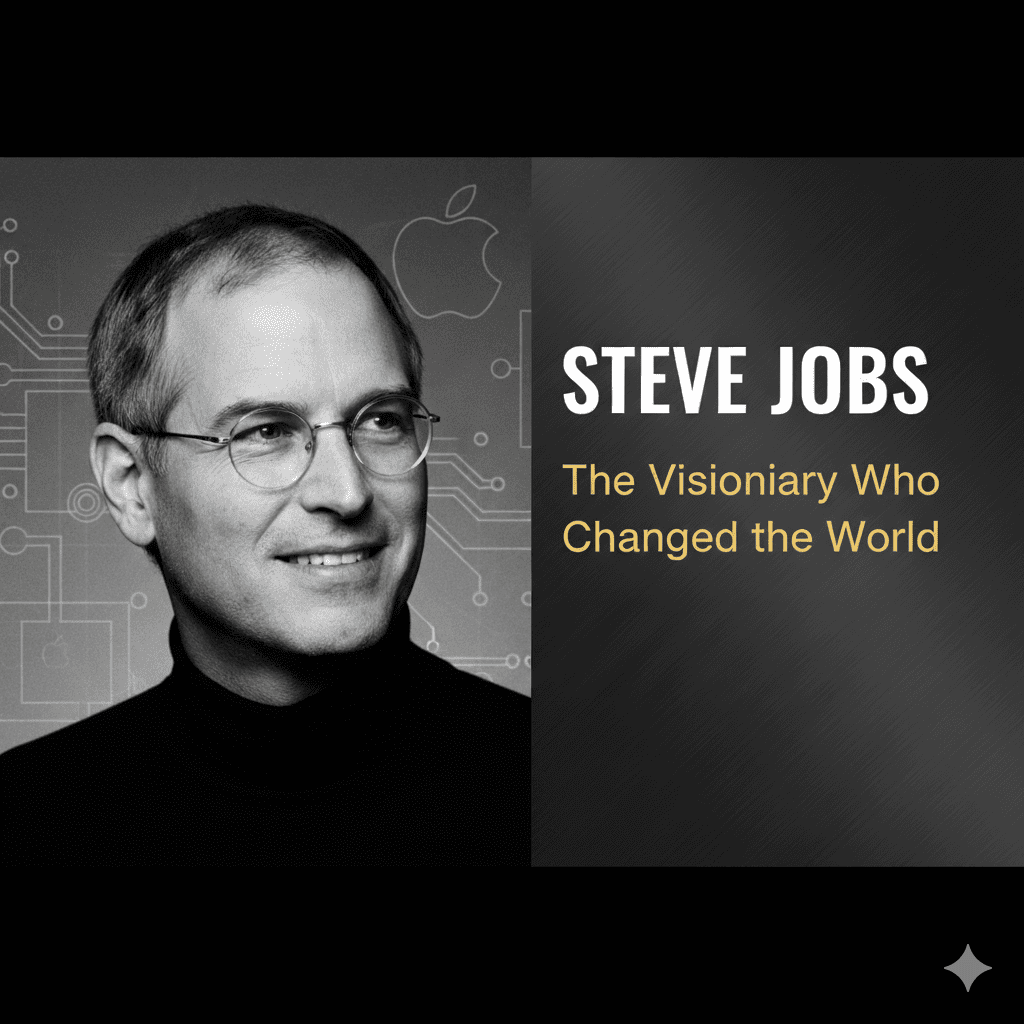Steve Jobs – The Visionary Who Changed the World
By: Compiled from various sources | Published on Oct 16,2025
Category Moral Stories

Look, Steve Jobs was complicated. Brilliant? Absolutely. A jerk sometimes? By most accounts, yeah. But his story is worth knowing because it's messy and real in ways that most success stories aren't.
The Kid Who Didn't Fit In
Jobs was born in San Francisco in 1955 and got adopted pretty much right away. Grew up in Silicon Valley—lucky timing, honestly—in a regular middle-class home. His parents weren't rich, but his dad showed him how to work with his hands, fix things, take stuff apart.
School was rough for him though. Not because he was dumb—opposite problem, actually. He was that kid who wouldn't stop asking "why" and drove teachers crazy. Got labeled as difficult, rebellious, all that. But here's the thing: that same stubbornness that made him a pain in class? That's what later made him refuse to accept "good enough" products.
The College Dropout
He went to Reed College, dropped out after one semester. Couldn't see the point, didn't want his parents wasting money on classes he didn't care about. But—and this is the interesting part—he stuck around campus and just showed up to whatever interested him. Like calligraphy classes. Sounds random, right?
Years later, he said those calligraphy lessons influenced how Mac fonts looked. That attention to beautiful typography? Came from a class he crashed as a dropout. Sometimes the stuff that seems pointless ends up mattering way more than you'd think.
Starting in a Garage (Yeah, Really)
- Jobs and his buddy Steve Wozniak (who was the actual technical genius, let's be honest) started Apple in a garage. They wanted to make computers that normal people could actually use, not just hobbyists and engineers.
The Apple I was pretty basic, but it worked. And Jobs had this obsession with how things looked and felt, not just whether they functioned. Most tech guys back then thought that was stupid. Who cares if a computer is pretty? Turns out, a lot of people do.
Money was tight. Nobody really believed in them. Woz was doing most of the engineering while Jobs handled the vision and sales pitch. It was scrappy and stressful, but they pushed through.
Getting Fired From His Own Company
Here's where it gets wild. By 1985, Apple's board kicked Jobs out. His own company. The thing he built. Can you imagine?
He was 30 years old, publicly humiliated, and everyone figured that was it for him. Career over. But instead of disappearing, he started NeXT—another computer company—and bought this little animation studio called Pixar for cheap.
NeXT never really took off commercially. But Pixar? That became the studio behind Toy Story, Finding Nemo, all those movies. Jobs turned a failing graphics company into an animation empire. Sometimes your "failures" end up being the best things that happen to you.
The Comeback
- Apple was dying. Literally about to go bankrupt. They brought Jobs back—basically begged him to come save them. And he did.
First came the iMac with those colorful, weird-looking designs. Then the iPod changed how we listen to music. The iPhone basically killed every other phone on the market. The iPad created a whole new category.
But working with Jobs during this time? Brutal, apparently. He'd call your work garbage to your face. He made people cry. He was a perfectionist to the point of being cruel sometimes. There's no sugar-coating that part.
What Made Him Different
Jobs had this thing about connecting art with technology. He didn't just want products that worked—he wanted them to be beautiful, intuitive, almost emotional. That's why Apple stuff feels different from other tech.
Was he always right? No. He made plenty of bad calls. But he trusted his gut even when everyone said he was wrong. And more often than not, turns out people did want computers that looked like art and phones with no keyboards.
The Real Takeaway
Jobs died in 2011. Too young. Too much left to do. But what his story actually shows—beyond all the hype and mythology—is pretty straightforward:
Weird kids who don't fit in sometimes end up changing everything. Your "problems" might actually be your strengths.
Getting knocked down isn't the story. It's whether you get back up. Jobs lost everything and rebuilt twice as big.
Passion beats planning most of the time. He dropped out, took random classes, followed what fascinated him. Somehow it all connected later.
Being nice and being successful aren't the same thing. Jobs wasn't always kind, but he was effective. (Though maybe he could've been both—just saying.)
Perfect is possible. Or close enough to it that people notice. His obsession with details drove everyone nuts, but it's also why Apple products feel special.
Why This Matters Now
What gets me about Jobs' story is how non-linear it was. He didn't follow the "right" path. Dropped out, got fired, made stuff nobody understood at first. But he kept going because he couldn't not do it.
If you're working on something and people think you're crazy, or it's not working yet, or you failed spectacularly—that's not the end. Jobs got publicly humiliated at 30 and came back to change the world at 42.
The lesson isn't "be like Steve Jobs." Most of us aren't that brilliant or that difficult. It's more like: trust what fascinates you, don't give up when things fall apart, and maybe—just maybe—your weird obsessions are actually your greatest asset.
Amazon Affiliate Disclosure
As an Amazon Associate I earn from qualifying purchases.
Comments
pramodchaudhary2006
November 27,2025
Nice

.png)
.png)
